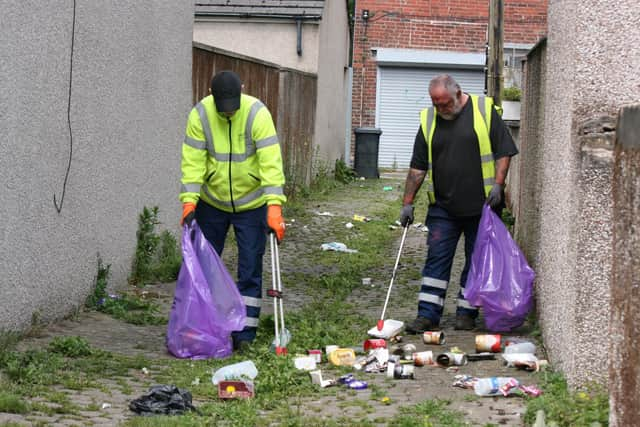Cost of keeping Lancaster district’s streets clean is revealed
and live on Freeview channel 276
The cost includes work to tackle fly-tipping, as well as penalties given to offenders.
A scheme targeting hot-spots has brought some success, city councillors were told during the latest full council meeting.
Advertisement
Hide AdAdvertisement
Hide AdIn the past year, high profile visual tactics have been tested, using ideas from other parts of the UK and working with the Keep Britain Tidy campaign.


Tactics have included placing crime scene-style cordon tape and stickers around dumped material in alleys and leaving it uncollected for days before removal.
Anti-litter messages have also been sprayed on walls or pavements using stencils and chalk-based paint, highlighting the financial cost of tackling litter to the public and emphasising that litter does not magically ‘disappear’.
On main streets with shops or offices, new ‘no waste on streets’ bin and container arrangements have been considered.
Advertisement
Hide AdAdvertisement
Hide AdCoun Joanne Ainscough, cabinet member for environmental services, said street cleansing accounts for £1.8m in the 2023/24 financial year.
This includes street bins, mechanical sweeping, fly-tipping, graffiti removal, fly-posting and litter-picking.
Rounded costs for recent years were £1.7m in 2022/23, £1.5m in 2021/22, £1.6m in 2020/21 and nearly £1.9m for 2019/20.
During those five years, there were 11 prosecutions and 39 fixed penalty notices handed out.
Advertisement
Hide AdAdvertisement
Hide AdFixed penalty notices can potentially lead to prosecutions but the fines were paid before any escalation of action.
Coun Ainscough added: “The city council is committed to reducing the issue of fly-tipping across the district. It sees illegally dumped waste as the number one environmental challenge.
“Schemes and interventions tested in the last year saw a reduction of incidents in hot-spots and this work will feed into future strategies and action plans for tackling this issue.
“Enforcement is not the sole answer to tackling the issue and comes in many forms, not just prosecutions. The council uses different methods including formal letters, community protection warnings, fixed penalty notices and other measures under environmental protection laws.
Advertisement
Hide AdAdvertisement
Hide Ad“Evidence suggests that education, policy and community cohesion are much more powerful tools in reducing this issue, which is a blight on communities. The council is continuing it work with Keep Britain Tidy and building a district plan.”